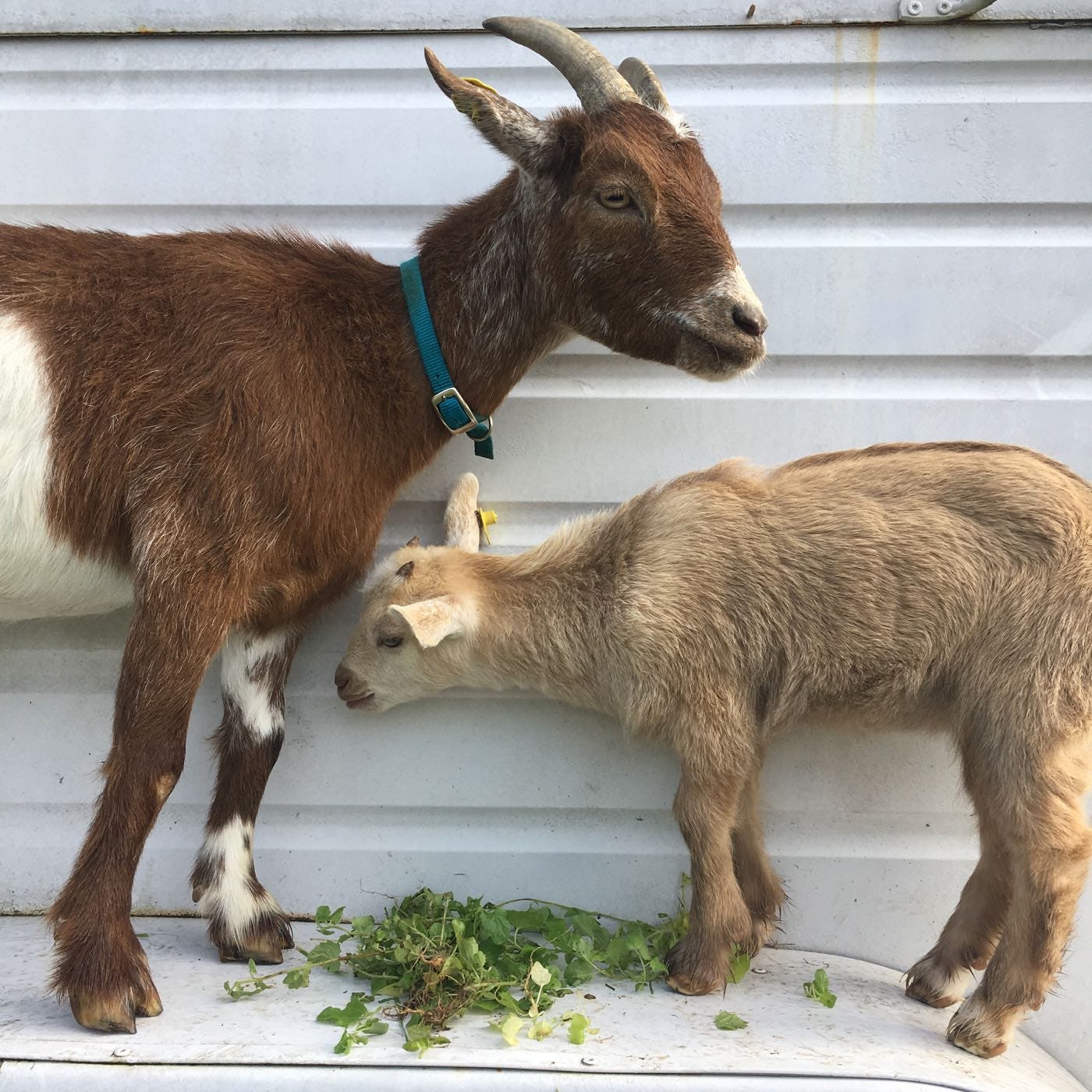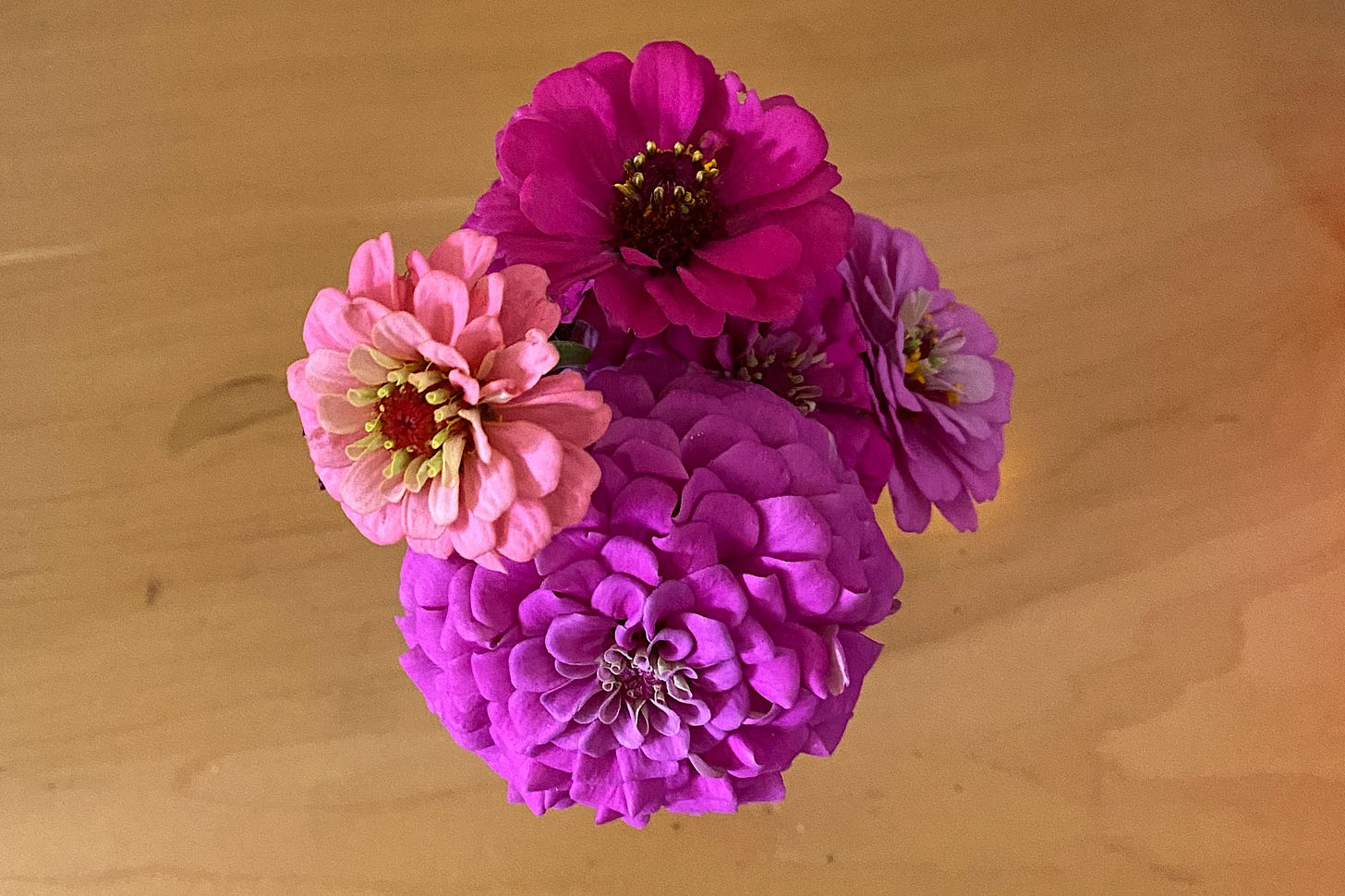Considering August
Some fragmented thoughts on a baby goat, zinnias, iced coffee, fried goodness, the flight of swifts, and resilient Beirut
The 64th Day after Coronatide*
Grand Rapids, Michigan
Greetings, dear reader.
A couple of summers ago, I met a goat named August. As the name might suggest, she was born that August, and a few weeks later, she and her mother, Daisy, came to live at the Farminary. The professor of a course on the culture of ancient Israel, Elizabeth Bloch-Smith, wanted to give her students just the tiniest taste of what it might have been like to live in that agrarian society, so she recruited Daisy and August as unofficial teaching assistants. Each student was assigned a day for goat chores. I didn’t take that course, but as a farmhand, I also got to help care for Daisy and August.

Daisy barely tolerated me or any other human, but August was as extroverted as I am introverted. A sentence I never imagined I would write: That goat changed my life. You can read a story I wrote about that experience here.
I found out a few days ago that August died recently, just shy of her second birthday. She got sick late in the spring, though her owners never figured out with what. They gave her the best care they could, but she didn’t make it. Pygmy goats typically live ten to twelve years, so August’s life was short. But she had an uncommon reach. I and other seminarians regularly visited and splashed August all over our Instagram feeds. One day, as I was leaving the goat pen, I ran into a professor who told me that she had just gotten out of a particularly difficult faculty meeting and she thought some time with August might be a good antidote; I could only agree. And after I talked about August on Jen Hatmaker’s podcast, she found fans far and wide.
It’s funny how a bleating creature like August can make a difference to so many humans.
While I’m slightly sad at August’s death, I’m mostly just grateful.
I’m grateful that our encounters came with no preconceptions, no expectations—because what did I know? Nothing. I’d never hung out with a goat before.
I’m grateful that she, unconstrained by a human body, leapt over the pile of baggage I bring to human relationship, stomped all over my cynicism, and summoned me to more openheartedness.
I’m grateful that she never subscribed to any scarcity models and rarely seemed to tire of offering her affection and cheer to anyone who visited her.
I’m grateful that she reminded me that even I, an overly serious and sometimes unbearable over thinker, also need to play.
I’m grateful that she offered a beautiful lesson in unexpected grace—the grace of welcome, the grace of delight, the grace of space to be and to imagine anew, the grace that gives birth to gratitude and opens us once again to love.
I hope, on your own journey, you’ll encounter creatures like August who help you to see things afresh and to tap springs of goodness and possibility that you didn’t even know were there.

What I’m Growing: I basically dumped a whole packet of sunflower seeds in the garden and not a single one has come up. But the zinnia have done well. I think they’re even prettier when you had a hand in growing them.

What I’m Cooking: I do most of the cooking in our household, but Tristan always makes the coffee. We’ve developed a lovely rhythm during these COVID-19-tinged days: Around 2:30pm, he makes a fresh, extra-strong pot. Then he cools the coffee, pours it over ice, adds cream (not milk!), and then brings me an iced coffee in my study. So here’s the debate: We use good cream, from a dairy the next county over, and I love love love the cream, so I’m at about 60% coffee, 40% cream—okay, some days it’s maybe more 50/50—and I swear you can still taste the coffee. Tristan calls my version a “milkshake,” which seems... rude. There’s no milk in it at all! He goes mostly for milk—we only buy whole milk, because I’m not interested in white water—with just a “splash” of cream for richness, which to me is unnecessarily austere in a time when we can use some little luxuries. How much cream do you put in your iced coffee?
Over the weekend, we had a “fry,” which is our shorthand for making a quick tempura batter and frying up some guilty pleasure. This time, we had okra, onion, and Hungarian wax pepper, which is typically jalapeño-like in its spice level—all from the farmers’ market. But in the past, we’ve fried fish, shrimp, scallops, zucchini, mushrooms... it has all worked great. The batter is simple, gluten-free, and produces a wonderfully light and crispy texture. It’s 1/2 c rice flour, 1/2 c cornstarch, a teaspoon of salt, an egg, 3/4 c of sparkling water (colder is better), and a couple of ice cubes. Seafood probably wants a slightly thicker batter, so I’d reduce the amount of water or increase the flour or cornstarch a bit. Your oil should be 350-375 degrees—any cooler and your fry will be overly greasy, any hotter and it will darken too quickly. Salt the ethereal goodness as soon as it emerges from the oil. I serve it with a sriracha mayo—basically, equal parts mayonnaise and Greek yogurt spiked with as much sriracha as suits your palate, a squeeze of lemon juice, and salt and cracked pepper.
What I’m Reading: The English nature writer and researcher Helen Macdonald had a lovely essay about swifts in this past Sunday’s New York Times Magazine. The best nature writing opens up dimensions of this world that we don’t normally see, and it helps us reimagine our place in that world. This piece does that in such a gentle and moving way, as Macdonald takes the reader on a journey with the swifts, remarkable birds that lead unusual, airborne lives in community. “To orient themselves correctly, to make the right decisions,” she writes, “they need to pay attention not only to the cues of the world around them but also to one another.”
What I’m Listening to: Worship music isn’t always easy for me. So much detritus from youth! But the Porter’s Gate, a collective that includes artists such as my dear friend Audrey Assad, crafts music that is relevant and grounding, beautiful and soul-enriching. One song that has meant a lot to me, “Your Labor Is Not in Vain,” reminds me that even when the desired results of our work seem elusive, we live in hope.
The Porter’s Gate has recently recorded two albums of new music, specifically meant to address the tumult of 2020. They’ve called these projects Songs for Lament and Justice. They’re in the midst of a Kickstarter campaign to finish this worthy work. I hope you’ll join me in supporting them.
Finally, speaking of lament: 2020 has brought wave upon wave of grief, storm after storm of catastrophe, and so much of it exacerbated by the failures of humanity. We need not rank these sorrows. But I do think it’s right to name them. This week: Beirut, a city that has already suffered so much, finding its way through the aftermath of the tragic explosions in its port. We laud resilience, but there’s a perversity to it, because how much can one people bear?
I was last in Beirut a decade ago, to celebrate the wedding of dear friends. So many of the old buildings still bore the pockmarks of war, bullet holes that testified to an era that residents hoped was behind them. The lavish tables overflowed with generous hospitality and a profound culture of welcome that endured through it all. We feasted on mujadara and lamb, labneh and warm pita. Now in that same city, hundreds of thousands are homeless, families are grieving the dead and the wounded, and once again, the city’s people are summoning their hard-won resilience.
If you’d like to help in the relief efforts there, Preemptive Love is a wonderful organization I’ve long supported that is now feeding people in Beirut affected by this disaster. They could use your partnership.
“O Lord, how long?”
“How long, O Lord?”
Over and over, psalmists use this turn of phrase—Psalms 6 and 13, 35 and 74, 79 and 89, 90 and 94—pleading with the Almighty. They’re echoed by the prophets of old, Isaiah and Jeremiah and Habakkuk. Many of us now join in that anticipatory chorus—waiting and hoping for redemption, longing and moving toward good.
But never alone: I’m so glad we can stumble through all this together. I’ll try to write more soon.
Jeff
*I’m still counting from June 1, when my governor, Gretchen Whitmer, lifted Michigan’s stay-at-home order. We miss our friends. We’d love to see our family. Please, for the sake of yourself and your neighbor, wear a mask and help us get through this mess alive.

